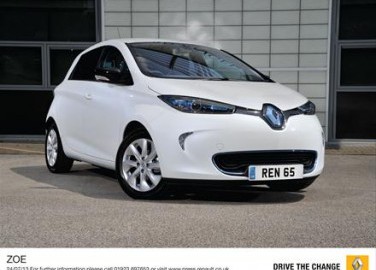A new ownership package for two of Renault’s most popular electric vehicles has been welcomed by the leasing industry.
It will now offer customers in the UK the chance to buy the Kangoo ZE and Zoe with a battery; previously the only option was to lease the power source separately.
It’s a shift in policy that has won the support of some of the country’s biggest leasing companies, which struggled to forecast accurate residual values for the vehicles.
In fact, Zenith Leasedrive simply chose not to include the Kangoo ZE and Zoe in its EV line-up at all, but told Fleet News that both vehicles will now be offered to customers.
Ian Hughes, commercial director at Zenith Leasedrive, said:
“We are delighted with the change of direction by Renault in its electric vehicle strategy.
“It was particularly difficult to forecast an accurate residual value in circumstances when a vehicle is bought but the battery hired – a bit like trying to sell a car without an engine.”
The policy required Alphabet to create a complicated “workaround”, according to its head of consultancy services, Jon Burdekin. He said:
“This move from Renault removes the complication. It will also remove any potential confusion in the market as to whether the battery is included in the quote or not. By making things easier to understand, Renault brings itself in line with other manufacturers in an area which it was previously behind on.”
Lex Autolease, like Alphabet, was already offering Renault EVs, with Kangoo ZE and Zoe amongst a fleet of some 700-plus plug-in vehicles leased by the company.
But Chris Chandler, Lex Autolease’s principal consultant, also recognised the difficulties that came with the leased battery option. He said:
“The introduction of a battery purchase option will make contract hire simpler for Lex Autolease. It is much simpler for us as a business to own both the battery and the vehicle.”
The French manufacturer had insisted that its battery leasing model offered the best deal for drivers contemplating a plug-in car. It argued that it reduced the transaction price of its plug-in vehicles and made them more competitive (fleetnews.co.uk, March 11, 2014).
However, pricing expert CAP refused to forecast used values for Renault’s EVs until the battery was included, and new tax rules meant the cost of replacing the battery would have to be added to the car’s list price for P11D purposes from 2015/16 (fleetnews.co.uk, April 5, 2013).
Renault hopes that by simplifying its offer to the leasing industry it could create greater traction in the fleet market.
“This will open the door to fleet [customers],”
said Ken Ramirez, managing director of Renault UK.
“The addition of full purchase versions on our core EV models will offer business customers a greater choice and further strengthen our position in the EV market.”
The Zoe i – the ‘i’ stands for battery included – is available from £18,443 on-the-road, after the Government’s plug-in car grant, compared to £13,995 on battery lease. The Kangoo Van i range starts at £16,161 (+VAT) after the grant, compared to £12,995 (+VAT) if the battery is leased.
Steve Jones, general manager of asset risk at Leaseplan, agrees that the change could generate more interest from corporate customers. He said:
“Both Zoe and Kangoo are strong propositions in the electric vehicle market, but the leased battery added a level of uncertainty for fleets and contract hire companies alike.
“The process came across as complicated and some companies may not have considered Zoe and Kangoo ZE in their selection process as a result. Now this complexity has been removed, it’s much easier for customers to work with Renault so we should start to see an increase in adoption.”
This could also have a positive effect on RVs.
“The used car market doesn’t like uncertainty and the position on the battery lease has always been that,”
explained Nick Hardy, sales and marketing director at Ogilvie Fleet.
“The true test will be in how the used car market views these vehicles in three to four years’ time and what, if any, difference it makes with actual, real-world residual values.”
Source: Fleet News
